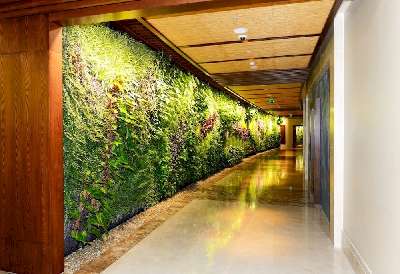|
|
|

What is Biophilia?
By Brian Murch, Principal, DLR Group
A culture of curiosity and thoughtful hospitality design has driven us as designers and creatives to constantly explore the guest journey and the creation of meaningful experiences. Today's tech-driven fast-paced world amplifies the need to take a step back and reconnect with our natural surroundings. Re-imagining spaces that utilize natural and organic design elements offers a moment of pause and contrast to the rich urbanistic surroundings of which we are accustomed. Nature-inspired design infusion creates balance and fulfills our inherent need to reconnect with nature and the outdoors; in the design world, this increasingly utilized approach is known as "biophilic design" and is adding another dimension to how we curate the hospitality guest experience.
|
 |
|
|
|
| TRENDING THIS WEEK |

What Happens When Quality Assurance Morphs into PR & Marketing?
By Steven Ferry, Chairman, International Institute of Modern Butlers
A bold and perhaps perplexing question, but the unfortunate reality is that almost all third-party Quality Assurance audits are designed either to increase membership in a club that guests used to use as a barometer of whether or not a hotel or resort would be good (where mostly today they make these decisions based on social media/OTAs); or to be included in a magazine that some guests refer to for the same reason. The goal of those participating does not necessarily add up to improved service and guest experience-more to influencing guest perception and awareness of the property and so strengthening sales.
|
|
|
|
|
 |
This week's Top Pick... |
|
| |

Biophilic Design: Our Future Is Our Past
By Jasmine St. Clair, Vice President of Design & Construction, Prism Hotels & Resorts
What does biophilic design look like? What does it feel like? Where is biophilic design most prevalent, how is it deployed, and what are the potential benefits of a well-executed biophilic design scheme? Jasmine St. Clair, Vice President of Design and Construction for Prism Hotels and Resorts discusses the growing popularity and prevalence of biophilic design principles rooted deeply in our past, how we have lost the organic connection to design with a modernized approach and what the growing future of biophilic design looks like. She outlines how successful hotels are utilizing the age-old design style to incorporate beautiful multisensory, immersive and soothing spaces guests can enjoy.
|
|

|

|
|
|
DAILY HEADLINES - Monday Nov 18, 2019 |
|
|
|
|
|

|
 |
More from our online Library Archives... |
|

The Life-Cycle of Hotels and Corresponding Risks
By Alexandra Glickman, Area Vice Chairman & Managing Director, Gallagher Real Estate & Hospitality Services
"Experience" is the watchword for the Hospitality sector, but there is hidden exposure, both financial and physical in every operating property. As assets work to differentiate themselves by amenities, physical attributes and "one of a kind" offerings, there is the constant exposure to financial risk caused by natural and man-made physical damage to the asset as well as potential injury to guests and employees. This article identifies key issues in all of the phases of an assets operations: Development; Operational and Post-Loss Recovery.
|
|
|
|
|
|

What is Wellness Architecture?
By Anthony DiGuiseppe, Principal, DiGuiseppe Architect
Architecture is the built environment that defines space and affects the way people live, whether you are a modernist or a traditionalist. Wellness is a state of health and mindfulness that not only brings each of us in tune with nature, both our bodies and minds but also gives us a spiritual attitude towards one another on a global basis. Is it possible to combine the two, Wellness and Architecture? There are many examples of how this attitude of wellness in building has started to take form. Let's take a look at how this movement is evolving and the opportunities it brings to the hotel industry.
|
|
|
|

Use of Historic Tax Credits to Assist in Adaptive Reuse of Buildings as Hotels
By John Tess, President & CEO, Heritage Consulting Group
The success of a hotel is predicated on providing a product that is embraced by the market. Some customers value brand loyalty and a standard product while others look for unique experiences with a custom product. In determining the viability of a hotel, product and location are essential to success. Over the past decade, there has been resurgence in the viability and attractiveness of America’s urban areas, as witnessed by the proliferation of centrally located hotels. Where buildable lots are at a premium, the reuse of historic buildings as hotels has grown significantly. While old hotels are often upgraded to meet market demands, the reuse of non-hotel historic buildings has been significant and dramatic.
|
|
|
|
|
 |
December 2019: |
|
Hotel Law: A Labor Crisis and Cyber Security |

According to a recent study, the hospitality industry accounted for 2.9 trillion dollars in sales and in the U.S. alone, was responsible for 1 in 9 jobs. In an industry of that scope and dimension, legal issues touch every aspect of a hotel's operation, and legal services are required in order to conform to all prevailing laws and regulations. Though not all hotels face the same issues, there are some industry-wide subjects that are of concern more broadly. One of those matters is the issue of immigration and how it affects the ability of hotels to recruit qualified employees. The hotel industry is currently facing a labor crisis; the U.S. Labor Department estimates that there are 600,000 unfilled jobs in the industry. Part of the problem contributing to this labor shortage is the lack of H2B visas for low-skilled workers, combined with the difficulty in obtaining J-1 visas for temporary workers. Because comprehensive immigration reform is not being addressed politically, hotel managers expect things are going to get worse before they get better. Corporate cyber security is another major legal issue the industry must address. Hotels are under enormous pressure in this area given the large volume of customer financial transactions they handle daily. Recently, a federal court ruled that the Federal Trade Commission had the power to regulate corporate cyber security, so it is incumbent on hotels to establish data security programs in order to prevent data breaches. The lack of such programs could cause hotels to face legal threats from government agencies, class action lawsuits, and damage to their brand image if a data breach should occur. These are just two of the critical issues that the December issue of Hotel Business Review will examine in the area of hotel law.
|
|
|
|
|